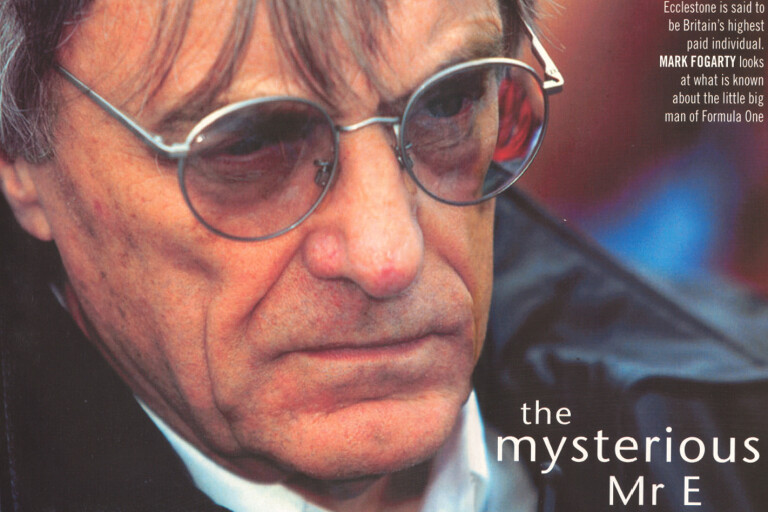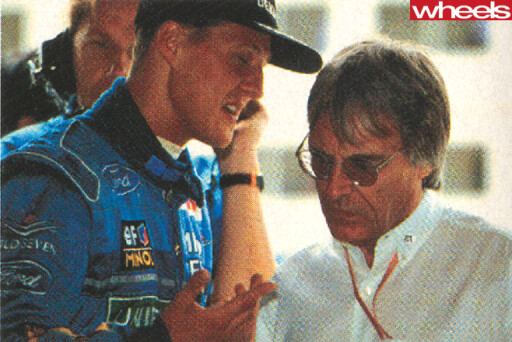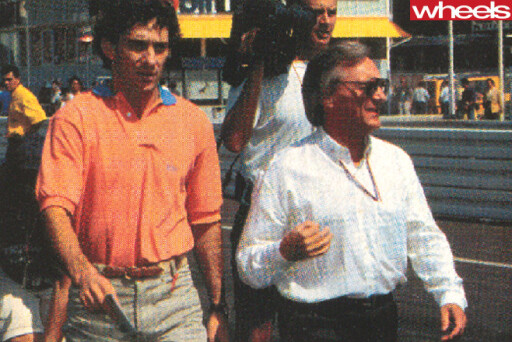
ETERNAL enigma Bernie Ecclestone is said to be Britain’s highest paid individual. Mark Fogarty looks at what is known about the little big man of Formula One.
First published in the January 1999 issue of Wheels magazine, Australia's most experienced and most trusted car magazine since 1953.
Everyone in Formula One is scared of Bernie Ecclestone. Nobody who earns a living from F1 dares to criticise Ecclestone openly, much less cross him. For insiders, the consequences of getting on the bad side of Bernard Charles Ecclestone are too terrible to contemplate. Or so they say. The problem with trying to separate fact from fiction about Ecclestone's fearsome reputation is that there's plenty of hearsay, but no evidence to prove his reputed malevolence. There is no debate that he runs F1; the only discussion is whether he rules by fear or finesse.
 The Mysterious Mr E - January 1999
The Mysterious Mr E - January 1999
View this article in its original format in the archive.
There is nothing of any consequence in F1 Bernie doesn't control or, at least, influence. At the heart of the Ecclestone empire is Formula One Holdings (FOH), the family trust-owned corporate umbrella for the businesses which administer the key operations of ‘F1 Inc’. Bernie is president of Formula One Administration (FOA), his letterhead company through which flows the main streams of revenue – TV rights and race franchise fees.
FOA controls the conduct of each grand prix and, in some cases, promotes the actual events, as well as being the absolute authority on TV rights and the allocation of paddock passes. Through his association with longtime confidant Paddy McNally's Geneva-based Allsport Management, Ecclestone also has dominion over circuit advertising, promotional activities and corporate hospitality at each race.
 Ecclestone's corporate tentacles extend to ownership and/or production of all F1 broadcast footage, much of which is generated by FOCA TV. He has invested tens, if not hundreds, of millions of dollars into controlling every piece of F1 vision, past and present. FOCA TV is based at a sprawling facility at the old Biggin Hill airbase, just outside London, from where his private jet is also deployed.
Ecclestone's corporate tentacles extend to ownership and/or production of all F1 broadcast footage, much of which is generated by FOCA TV. He has invested tens, if not hundreds, of millions of dollars into controlling every piece of F1 vision, past and present. FOCA TV is based at a sprawling facility at the old Biggin Hill airbase, just outside London, from where his private jet is also deployed.
And somewhere in his corporate labyrinth is the Formula One Constructors Association (FOCA), once the representative body of the teams but now an entity of indeterminate status. Additionally, Bernie Ecclestone manages to juggle the apparent conflict between his overtly commercial interests and his sporting duties as vice-president, promotional affairs, of the FIA.
Somehow, either through sheer savvy or masterful manipulation (or both), Bernie's balancing act works. Works so well, in fact, that F1 and all those involved in it have prospered under his rule, while also making him spectacularly rich. So rich that he has been forced to emerge from the shadows in the past year or so.
Interest in his activities was triggered by the leak of his plans to tum FOH into a public company and the revelation he had donated £1 million to Britain's Labour Party, which was linked to the Blair Government's controversial concession to exclude F1 from its pre-election pledge to ban all tobacco sponsorship in sport.
Then came a damning cover story in a recent issue of Business Age, the maverick business magazine which loves lifting the lid on borse brawls. Under the headline 'Can you trust this man to run a public company?', the extensive story sticks the boot into Bernie, alleging he has been stashing it away at the expense of the teams.
It's an inflammatory article which – if the facts, figures and assertions are true – explains why McLaren and Williams refused to sign the Concorde Agreement until the eve of last year's Monaco GP, holding out for a bigger slice of the TV rights pie. According to Business Age, uncharacteristic errors by Ecclestone blew the gaff on the disproportionate share he takes from the revenue generated by TV and race fees.
"Ecclestone only has himself to blame," the magazine says, reporting that his legendary judgment deserted him’ in 1996. "First, he allowed a series of financial and contractual disputes with circuit organisers to go to court instead of being settled. Then his company accounts were published, showing him to be Britain's highest paid person. He also allowed ITV to reveal to the world what it was paying to seize the British TV rights from the BBC."
Business Age claims that central to Ecclestone’s undoing was the revelation a year ago that in 1993 he signed a secret deal with the FIA, giving him exclusive ownership of the TV rights to F1 for 25 years. It alerted not only the teams to the riches they hadn't realised TV revenue raised for Bernie, but also the EU’s Competition Commission, which smelt an illegal monopoly.
 The magazine alleges, "The prospect of a public prospectus has opened up the secret world of Bernie Ecclestone. At its heart is an illegal contract and investors won’t stand for it". The publication concludes that the planned flotation of FOH is "now all but dead" and that "only a miracle could revive the project". It adds: "The float has foundered... because Ecclestone, for the first time in his life, was caught flat footed and looking stupid."
The magazine alleges, "The prospect of a public prospectus has opened up the secret world of Bernie Ecclestone. At its heart is an illegal contract and investors won’t stand for it". The publication concludes that the planned flotation of FOH is "now all but dead" and that "only a miracle could revive the project". It adds: "The float has foundered... because Ecclestone, for the first time in his life, was caught flat footed and looking stupid."
Informed insiders say that key data in charts accompanying the article – listing team budgets and incomes, and driver earnings – is wrong, casting doubts on the accuracy of the story. It is understood Ecclestone has initiated legal action against Business Age.
Despite all this unwelcome interest and uncertainty among F1 folk, Mr E – the moniker he uses on his fax header – is definitely Mr Big. Whatever the reasons, the simple fact is that his reputation precedes him. You only have to watch the diminutive despot scurry about the paddock at any grand prix to realise how pervasive is his authority. His presence parts crowds like Moses parted the Red Sea.
Ecclestone is a control freak. At his posh London office, visitors aren't made to feel welcome so much as privileged. Whether it's a psychological ploy or just extreme neatness, there is nothing on which to sit while you're waiting in the reception area. You stand there, shuilling uncomfortably in front of the impassive receptionist, while FOH staff appear and disappear through doors which, when closed, are indistinguishable from the panelled walls.
When you are finally ushered into Mr E's large and sumptuous office, which looks out onto manicured gardens, you sit before him on a chair so low you have no choice but to look up over the desk at him. It's just one of the many ways he accentuates his imposing aura, which is very much at odds with his physical stature. Ecclestone is a short, slight and sprightly senior citizen - he admits to having seen 68 summers, although some suggest it is more - who peers at you through strong spectacles beneath a full fringe of grey hair.
Interviewing F1's Little Big Man is intimidating and often frustrating. The power of his presence can unsettle even the most hardened hack, and he uses withering wit and skilful semantics to deflect insistent interrogation. He is a master of the implied, saying things in such a way that you infer more than there actually is in the transcript of his words. He embellishes his speech with intonation that is suggestive, but intangible in print.
Bernie is, however, renowned as a man of his word and he is forthright, if not always forthcoming. He is also unusually courteous, making a point of returning phone calls or relying to faxes - even if the reponse can take hours, days or weeks, depending on how busy his schedule is. It's part of the Ecclestone enigma that despite his aversion to scrutiny, has no qualms fielding criticisms or provocative inquiries.
Ecclestone makes no apology for his autocratic approach to running F1, stating simply that he runs his business as he sees fit. "I just get on and do a job, and I do the job the way I think it should be done," he shrugs. "That's how it is and if it's wrong, then chuck me out. When it (FOH) becomes a public company and they all sit down and say this Ecclestone's doing it all wrong, they'll probably chuck me out and get somebody else. So, until then, that's the way I think it should be run ... That's the only way I know, anyway."
After nearly 20 years at the reins of F1, Ecclestone is showing no signs of waning enthusiasm. His only concession to his advancing years is that he now limits his office hours to 8-6 and keeps non-GP weekends free to spend with his family. He maintains that he still enjoys his work – "I wouldn't do it if I didn't" – and has no plans to retire any time soon.
Ecclestone says his enthusiasm to float FOH is in response to the teams' desire to ensure long term stability of F1's commercial arrangements. "Originally, a few years ago, the teams wanted to know what would happen when Bernie's not there any longer," he explains. "They were worried the company would fall into the hands of my wife or the family or whatever. So we came up with a method where they could take the company over but that suited some people and not others. It didn't suit Ferrari, for example, because they could see the English teams ganging up against them. Floating the company became a compromise solution."
That plan appears to have been stymied, however, by the market's unease with Ecclestone's secretive style and the ongoing investigations by the European Commission's competition directorate. Instead, Ecclestone now proposes issuing US$2bn worth of Eurobonds secured by current F1 earnings, with the possibility of flotation now sometime in the future. But financial pundits suggest the shaky economic climate will make risk-averse investors look elsewhere – and that questions over issues such as the future of controls on tobacco advertising and the likelihood the European Commission may rule against the Ecclestone monopoly remain unanswered.
In the most recent listing of Britain's 1000 richest people, Ecclestone's personal wealth was estimated at $4 billion, making him the sixth wealthiest person in the land. Despite his ability to amass a staggering fortune from brokering F1's global appeal, he is adamant that money is merely a measure of his success, not his motivation.
“I think in all businesses, when you reach a certain level, that it (money) is a by-product of what you do,” he says tritely. “You know, we go to the next race and the guys that are driving can see if they've done a good job or not straight after the race. The team knows whether it's done a good job. But how the hell do I know whether I'm doing a good job? The only way I can tell is profits. Money is the only real measure of a business person's success.”
Ecclestone was one of the first to recognise sport's value as a TV drawcard and the growth of F1 is directly attributable to his prescience. He has built the sport's success on the foundation of worldwide TV coverage and is now pioneering the use of pay-per-view digital broadcasts, which enable viewers to tailor race telecasts according to their particular interests.
So far, Bernie's expensive foray into digital pay TV – through FOCA TV, he has ploughed perhaps as much as $250 million into digital TV production – has had mixed success. While he acknowledges take-up has been slow in Germany, he claims there have been encouraging start-up audiences in France and Italy. Ecclestone accepts that only a small percentage of the audience will ever pay for the privilege of in-depth coverage but remains convinced that the concept is viable. “No way in the world do I have any misgivings,” he declares. “Without any shadow of a doubt, pay-per-view will be the way you watch major sport in the future.”
He also rejects claims coverage on free-to-air broadcasters suffered last year because he is trying to make digital telecasts more appealing. Critics cite the noticeable reduction in the variety of in-car shots made available for transmission by the host telecasters. “There is more in-car coverage than there's ever been before,” Bernie growls. “You must remember that we (FOCA TV) provide the in-car footage for the broadcasters – they don't do anything. It's up to the director to use it in any way he thinks fit.
“The good thing about digital is that you could, if you wanted to, watch literally the whole race from on-board cameras or you can watch the main race – what I call the leaders' race – or you could watch somewhere down the field where's there's a battle going on. You can also watch all the times, the pit stops and the replays.”
One of the big complaints about F1 is that the lack of wheel-to-wheel racing.
Bernie is convinced that the real appeal of F1 is the tension and expectation generated by the paucity of passing moves. He also believes that watching grands prix is an intellectual exercise as opposed to the instant gratification of, say, motorcycle racing.
“All this nonsense about overtaking and things like that is wishful thinking,” he sighs. “There's not a lot you'll ever do about that. People say to me that in Indycar or CART racing – or whatever it's called – there's overtaking all the time. But when you think about it, what they mean is that the lead changes a lot. The reason the lead changes is that there are generally four or five pit stops and the leader changes in F1 when there are pit stops."
At the end of the day, Ecclestone has the last laugh. While F1’s critics carp, the sport's popularity continues to grow, with more viewers in more countries tuning in each year and more nations vying to hold races. “We must be doing something right,” he chuckles. “And I always think that what we're selling is an event rather than a race. That's what it's all about. People are all becoming event people. They want to see big events.”
Bernie Ecclestone, in fact, is laughing all the way to the bank.
Hollywood project a Sly move?
Rocky in a race suit? Don't laugh. According to Bernie Ecclestone, Sylvester Stalone's F1-based movie will be more like Rocky than Days Of Thunder.
“I think it will be a bit more of a human thing than about racing,” Ecclestone predicts. “It'll be very, very, very, very F1 and there won't be any doubt what the film's about, but you don't need to have an hour of cars running around.”
Bernie expects his new best mate Sly to start production this month, with the movie scheduled for release in 2000, around the time the USA GP is due to return to the world championship. Conspiracy theorists think the film is part of Ecclestone's plan to raise the profile of F1 in the States, but he swears the timing is just a coincidence. “People have been saying for years, ‘Why don't we have a film (about F1)?’”
Bernie is “absolutely” confident that the States, without an F1 race since ’91, will be back on the calendar by 2000. He's negotiating with promoters in San Francisco, Atlanta and Las Vegas. His declared preference is Las Vegas, which he claims has shed its tacky image. “I think Vegas is good for us. It has more hotels, more entertainment, more of everything. It's a big entertainment place. It's not like it was... It's not sleazy.”

COMMENTS